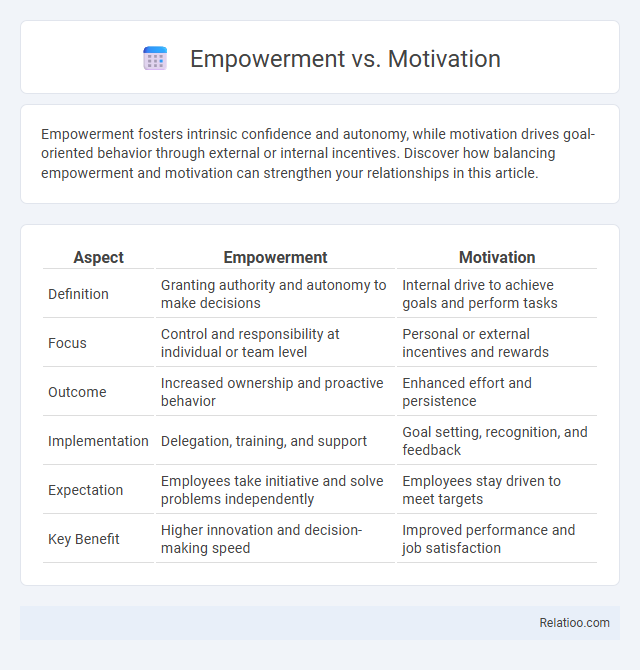Empowerment fosters intrinsic confidence and autonomy, while motivation drives goal-oriented behavior through external or internal incentives. Discover how balancing empowerment and motivation can strengthen your relationships in this article.
Table of Comparison
| Aspect | Empowerment | Motivation |
|---|---|---|
| Definition | Granting authority and autonomy to make decisions | Internal drive to achieve goals and perform tasks |
| Focus | Control and responsibility at individual or team level | Personal or external incentives and rewards |
| Outcome | Increased ownership and proactive behavior | Enhanced effort and persistence |
| Implementation | Delegation, training, and support | Goal setting, recognition, and feedback |
| Expectation | Employees take initiative and solve problems independently | Employees stay driven to meet targets |
| Key Benefit | Higher innovation and decision-making speed | Improved performance and job satisfaction |
Understanding Empowerment and Motivation
Understanding empowerment involves recognizing your ability to take control of decisions, fostering a sense of ownership and confidence in personal or professional growth. Motivation refers to the internal or external drivers that inspire your actions toward achieving specific goals. Both concepts play crucial roles in enhancing performance, with empowerment emphasizing autonomy and motivation focusing on the reasons behind your effort.
Key Differences Between Empowerment and Motivation
Empowerment involves granting individuals the authority, autonomy, and resources to make decisions and take ownership of their work, fostering a sense of control and accountability. Motivation refers to the internal or external drive that stimulates and sustains goal-directed behavior, often influenced by factors such as incentives, recognition, or personal ambition. The key difference lies in empowerment providing the means and authority for action, while motivation is the initiating force that inspires individuals to act.
How Empowerment Drives Sustainable Growth
Empowerment drives sustainable growth by enabling employees to take initiative, make decisions, and innovate within their roles, which increases productivity and fosters a culture of accountability. Unlike motivation, which often relies on external incentives to boost effort temporarily, empowerment cultivates intrinsic engagement by granting autonomy and resources, leading to long-term organizational resilience. This strategic allocation of decision-making power accelerates adaptability and continuous improvement, key factors for enduring competitive advantage and business scalability.
The Role of Motivation in Achieving Goals
Motivation drives your commitment and persistence in achieving goals by fueling the desire and energy needed to take action. Empowerment provides the autonomy and confidence to make decisions and overcome obstacles, while encouragement strengthens your belief in success. Understanding the interplay between motivation and empowerment enhances performance and goal attainment.
Empowerment Strategies That Work
Effective empowerment strategies include providing employees with autonomy, access to necessary resources, and opportunities for skill development, which enhance ownership and accountability. Encouraging open communication and decision-making fosters a sense of trust and confidence, driving intrinsic motivation. Organizations that implement structured empowerment programs see significant improvements in employee engagement, productivity, and innovation.
Motivational Techniques for Personal Success
Motivational techniques for personal success include goal setting, visualization, and positive reinforcement, which enhance intrinsic motivation by creating clear objectives and boosting self-belief. Empowerment focuses on providing individuals with the autonomy, resources, and confidence needed to take control and make decisions, fostering sustained engagement and growth. While motivation acts as the initial spark, empowerment sustains momentum by developing skills and resilience essential for long-term achievement.
Empowerment vs Motivation in the Workplace
Empowerment in the workplace involves granting employees autonomy, resources, and authority to make decisions, fostering a sense of ownership and increased job satisfaction. Motivation, on the other hand, refers to the internal and external factors that drive employees to achieve goals and perform tasks, often influenced by incentives, recognition, and organizational culture. While motivation focuses on stimulating employee effort, empowerment enhances their capacity to act independently and innovate, leading to higher engagement and productivity.
Measuring the Impact: Empowerment vs Motivation
Measuring the impact of empowerment versus motivation involves distinct approaches; empowerment is often assessed through increased employee autonomy, decision-making capabilities, and sense of ownership, which correlate with improved job performance and innovation. Motivation is typically evaluated using engagement surveys, productivity metrics, and behavioral indicators such as goal achievement and persistence. Effective organizations integrate both constructs, leveraging empowerment to sustain intrinsic motivation, which together drive higher performance outcomes and organizational commitment.
Combining Empowerment and Motivation for Optimal Results
Combining empowerment and motivation enhances workplace performance by fostering autonomy while driving goal-oriented behavior. Empowerment provides employees with the authority and resources to make decisions, whereas motivation fuels their intrinsic and extrinsic desire to achieve objectives. This synergy creates an environment where individuals are both capable and inspired, leading to increased productivity and job satisfaction.
Choosing the Right Approach: Empowerment, Motivation, or Both?
Choosing the right approach between empowerment, motivation, or both depends on organizational goals and employee needs; empowerment fosters autonomy and decision-making skills, while motivation drives performance through incentives and recognition. Integrating empowerment with motivation creates a synergistic effect, enhancing employee engagement, innovation, and productivity. Organizations that balance empowerment with targeted motivational strategies achieve sustainable growth and a resilient workforce.

Infographic: Empowerment vs Motivation
 relatioo.com
relatioo.com